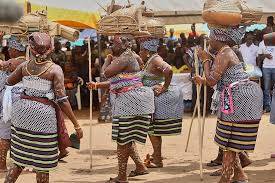Unity and Pride: Celebrating the Anlo Hogbetsotso Festival
The Anlo Hogbetsotso Festival, an annual celebration of the Ewe culture, has once again drawn thousands to the heart of Anloga in Ghana. This vibrant festival is one of the most anticipated events among the Ewe people, celebrated in early November to honor their ancestral journey from Notsie in present-day Togo to the Volta Region of Ghana. Hogbetsotso, which translates to "the exodus festival," commemorates the escape from oppression and serves as a powerful reminder of resilience, unity, and cultural heritage.
The week-long festival brought people from across Ghana and beyond to participate in a variety of events showcasing Ewe culture and traditions. Central to the festivities was a grand durbar attended by chiefs and dignitaries adorned in traditional regalia. The event highlights a cultural display of songs, dances, and drumming that echoes the rich history of the Ewe people, promoting solidarity and national pride.
A significant part of Hogbetsotso is the reconciliation ceremony, which involves community members and chiefs cleansing the land and mending relationships to reinforce the unity that characterizes Ewe values. This year, the ritual held special significance as it served as a platform for healing and dialogue, addressing social issues within the community and aiming for a harmonious year ahead.
The Agbadza dance, a traditional Ewe dance, remained a highlight, with participants—both young and old—showcasing spirited movements and costumes. The dance embodies freedom, celebration, and remembrance of past struggles, representing the strength and unity of the Ewe people.
Crafts, textiles, and local foods were also prominently featured, allowing attendees to immerse themselves in Ewe craftsmanship and cuisine. Vendors displayed Kente cloth, handmade jewelry, and other crafts that connect the modern world with centuries-old traditions, attracting both locals and tourists alike.
The Hogbetsotso Festival is more than a historical commemoration; it is a celebration of identity, a revival of cultural pride, and a reminder of the importance of unity in diversity. Every year, the festival continues to play a crucial role in preserving the Ewe heritage, passing down traditions, and fostering a sense of community among the younger generation.
As the festival concluded, it left attendees not only with memories of the colorful celebrations but also with a renewed appreciation for their cultural roots and a commitment to sustaining these traditions for generations to come.



No comments yet
Be the first to share your thoughts!